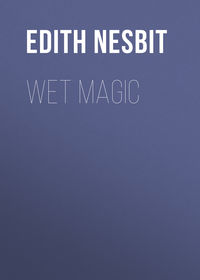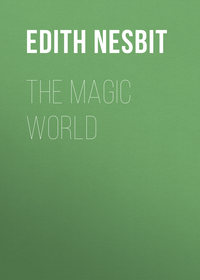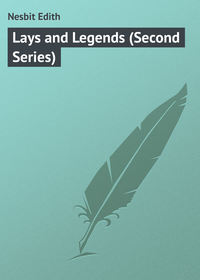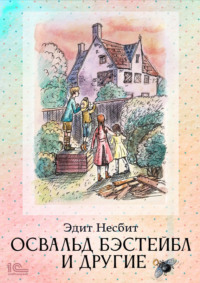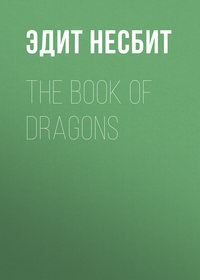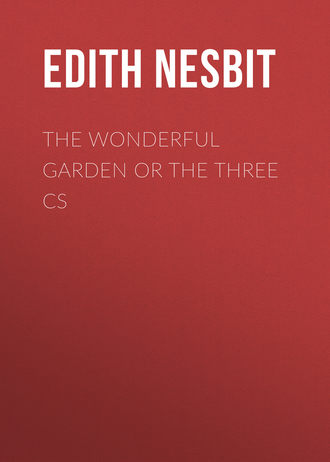 полная версия
полная версияThe Wonderful Garden or The Three Cs
‘Of course,’ said Charles. ‘Do you think I could ask him to let me have the wax image of him to keep in memorio?’
‘No,’ said Caroline, ‘of course you couldn’t. Hush! for goodness’ sake, hush!’
But there seemed to be no urgent need for hushing. The footsteps and the voices went past the dining-room towards the front door, which was at the side, as you know. No one listened, yet no one could help hearing, through the open window, the parting words of Rupert and the Murdstone man:
‘I’ll do it now. That’ll be the last. Thank you, sir. Good-bye!’
Then came the sound of retreating boots on gravel. The front door banged, and next moment Rupert came in. His eyes were very bright and his face very pale. He came in, shut the door, leaned against it, and seemed to swallow nothing, twice. Then he said, looking straight in front of him, and Charlotte noticed that his hands were clenched:
‘Look here, I’ve got something to tell you. I don’t suppose you’ll want to speak to me again after it.’
‘Yes, we shall,’ said Charles, ‘whatever it is.’
Rupert took no notice. He went on, after a moment’s silence:
‘I told a lie about Mr. Macpherson, a beastly lie. He didn’t hit me like I said he did. I didn’t mean to say it, I just said it, and then I couldn’t take it back. I’ve been most awfully wretched. That’s all.’
‘But you’ve owned up now,’ was the only comforting thing even Caroline could think of in that terrible moment. Charles, as pale as Rupert, with his eyes quite round, said:
‘You couldn’t have!’
Charlotte said nothing.
‘I’d like you to understand,’ said Rupert miserably, ‘before I go away.’
‘Go away?’ said Charlotte quite as miserably. ‘Where?’
‘Back to Mr. Macpherson, of course. Your uncle won’t keep me after this.’
‘Did he say so?’
‘No, he said I was to come back to him when I’d taken Mr. Macpherson to the door. But I feel I must tell you first, in case he sends me off right away.’
‘Oh, Rupert,’ said Caroline, ‘I am so sorry!’ And then she did something rather heroic. She saw that Rupert wanted to say more, wanted it desperately, and that he could not possibly say it to all three of them together, though he could have told it to one of them, either to her or to Charlotte, if they had been alone. So Caroline got up and said:
‘Charles, come outside. I want to say something’; and when she got him outside the door, ‘come out,’ she said earnestly. ‘Yes, you shall. Rupert doesn’t want the lot of us. Let him talk to Charlotte. He can’t stand a crowd.’
‘Isn’t it dreadful,’ said Charles in very shocked tones, ‘Rupert turning out a liar like this?’
‘Oh, don’t,’ said Caroline hotly; ‘it must have been awful for him, all this time. And now he’s sorry and he’s owned up. We’ve got to try and forget about it. Let’s talk about something else.’
But it was very difficult to talk about something else.
Rupert, left with Charlotte, saw the others go past the window.
‘I wanted to tell you before,’ he said; ‘that day when you talked about being disagreeable. Only I couldn’t.’
‘Dear old Rupert!’ said Charlotte. ‘I’m so jolly glad you’ve got rid of it. That was the black dog. I knew there was something. Do tell me, old chap, unless you’d rather not. The others are off down the avenue.’
Rupert left the door and came to the table, and, half-sitting on it, with his face turned away, and twisting the table-cloth into pleats, he said:
‘You know I always thought I was going to be an extra honourable sort of chap. Father used to say things. I never did anything like it before. You see I was awfully sick at having to go with Mr. Macpherson at all. He treated me as if I was a baby. At least that’s what I thought. He says now he meant to be kind and he thought I was younger than I am. And the bread and milk. Everything else I told you was true except hitting me. And he did say there were ways of dealing with sulky boys. And I decided I would run away. And I hurt my hand on a gate. And I was so angry, it seemed the only thing to do.’
‘I know,’ said Charlotte.
‘And then, when I was explaining to you, somehow I couldn’t find the proper words to explain how hateful it was, and I thought you’d think I’d run away just for nothing. And then my hand hurt, and I thought you thought something more ought to have happened. And then I said that. Mean beast!’
‘I do wish you hadn’t,’ said Charlotte.
‘It didn’t seem to matter just at first. I can’t think why. I thought he meant to hit me next day, and, anyhow, you didn’t know him. And then I got ill and nothing mattered. But when I got better, it kept on getting worse and worse and worse, like a corkscrew worming into you harder and harder and harder all the time.’
‘But why didn’t you own up before?’ Charlotte asked.
‘I couldn’t. I never should have if it hadn’t been for this.’
He pulled his handkerchief with some difficulty from his pocket. Something was wrapped in it. Rupert, his face still turned away, unfolded and held out the waxen man.
‘I came back through the woods yesterday, and then I saw you’d been trying that beastly spell I told you with the pins.’
‘Oh!’ said Charlotte.
‘And I knew it was because I’d told that beastly lie.’
‘Oh, it wasn’t,’ said Charlotte. ‘We did everything nice for him, to make him sorry he was hateful and to make him friends with you. And oh, Rupert, the spell did work! We did it to make him friends with you. And he is.’
‘He’s been jolly decent about it, anyhow,’ said Rupert. ‘I found the wax thing as I came home from Mr. Penfold’s last night, and I took it away and put it at the back of my collar-drawer. And this morning I took it down to Mr. Penfold’s. It made it easier to tell, somehow. And he was jolly decent too. He took me over to Tonbridge to tell Mr. Macpherson. And he said a lot of things. He said he’d known all along I’d got something I wanted to get off my chest. And he said things about repentance and things. I do like him.’
‘I’m glad we made the image,’ said Charlotte, because it seemed unkind to say nothing, and she could think of nothing else to say.
‘And I’m going to stick it, whatever it is. Mr. Macpherson is all right, but it will be hateful leaving here. Only I suppose you’ll all be glad I’m going.’
‘Rupert!’
‘Well, then, I know you won’t really. I say, Charlotte, you might tell the others. And tell them I know I’ve been a grumpy brute, but it was that going on all the time inside me like a beastly Spartan fox. It’s been like waiting at the dentist’s all the time, and this is like having all your teeth out at once, twenty times over.’
He tried to laugh, but he did not succeed very well. Charlotte also tried, and burst into tears.
‘Don’t!’ said Rupert awkwardly. Charlotte came close to him and rubbed her wet face against his coat sleeve.
‘You’re sorry,’ she said, ‘and you’ve owned up and you’ll never do it again.’
‘You bet I won’t,’ said Rupert. ‘I say, don’t! It makes it ever so much worse. Now I’ve got to go back to your uncle and get the kick-out. And I jolly well deserve it.’
‘Just wait a minute,’ said Charlotte. ‘I’m going to get something I want to give you before you go. Wait here, won’t you?’
‘Don’t be long then,’ said Rupert in calm wretchedness.
Charlotte dried her eyes and went out, went to her own room and got her favourite Lays of the Scottish Cavaliers. She wrote Rupert’s name in it and then marched straight to her uncle’s room, opened the door, and went in.
Uncle Charles, for once, was not reading or writing. He was sitting by his table drumming on it with his fingers and looking both sad and angry.
‘Uncle!’ said Charlotte.
‘Where is Rupert?’ said the Uncle, frowning.
‘He doesn’t know I’m here,’ said Charlotte, answering her uncle’s thoughts rather than his words. ‘I asked him to wait while I got something to give him. Uncle, you aren’t going to send him away, are you?’
‘I feel it only due to Mr. Macpherson to send Rupert back,’ said the Uncle, ‘to show that we regret the aspersions’ – the Uncle spoke as to a grown-up equal – ‘the aspersions cast on him by my abetting Rupert in his flight and removing him from Mr. Macpherson’s care. If it is a punishment to Rupert, it is not an undeserved one.’
‘Yes,’ said Charlotte, who hadn’t thought of this, ‘but Rupert’s been punished – all the time he has. No one else knows but me. He’s been perfectly miserable. Only he just couldn’t tell. And now he has, has told everybody, honourably everybody. Oh, dear uncle, don’t; I am so mizzy!’
‘Come here,’ said the Uncle, and Charlotte found a thin black-coated shoulder a very good place to cry on.
‘But you see,’ he said, ‘it’s only fair to Mr. Macpherson to send Rupert back. I am willing to believe that he has been punished enough.’
‘You don’t know,’ said Charlotte; ‘he’s been simply as unbearable as a bear, he’s been so unhappy.’
‘I didn’t know that,’ said the Uncle slowly; ‘but no, it’s not fair to that man. Rupert must go.’
Then Charlotte had one of her bright ideas, and its brightness dried her tears.
‘Look here, uncle,’ she said, ‘I’ve got it – I really have. Wouldn’t it make up to Mr. Macpherson and show your confidence just the same if you asked him to come here on a visit?’
‘I couldn’t,’ said the Uncle, and it was plain he spoke from the heart; ‘my work would all go – to pieces. I simply can’t have visitors, grown-up ones, I mean. The books you’ve found, they’ve revolutionised the whole scheme of my work. Yet,’ he added thoughtfully, ‘I owe you something for that.’
‘Then pay us with Rupert,’ said Charlotte eagerly. ‘Couldn’t you bear Mr. Macpherson just for one week-end? Then everybody would know you were friends with him. Oh, uncle, poor Rupert, he is so sorry. And he did own up.’
‘What was that about a waxen image?’ asked the Uncle. Charlotte told him, and he nodded now and then and said, ‘Yes, yes!’ and ‘Exactly!’ And at the end he said:
‘Well, you have attained your end. You have reconciled them. The charm seemed to have worked.’
‘They’ve all worked,’ said Charlotte, ‘every single charm we’ve tried. Have yours, uncle?’
‘I wish they had,’ he answered, sighing. ‘Charlotte, I wish I could do what you wish. Don’t try spells to make me, because I can’t. Rupert must go back to-morrow, for a fortnight at least. But he shall come back then till the end of the holidays. Will that do? And I’ll explain to him that it’s not punishment, but just the consequences of what he did. If he hadn’t told that lie he wouldn’t have had to go back.’
‘But would you have kept him at first, if he hadn’t told it?’ Charlotte asked.
‘He was unhappy there. That would have been enough,’ said the Uncle – ‘that and your spells.’
‘It’s all right,’ said Rupert to Charlotte later. ‘Your uncle’s forgiven me and I’m to come back. And he explained why I must go. And I see it. And I can stick it all right. And I’d rather suffer it up and start fair. I’d rather pay something. I shall have to write and tell my father. That’s worse than anything.’
‘And when you come back,’ said Charlotte, ‘we shall think it was all a bad dream.’
He went next day. The three C.’s saw him off at the station, all wearing arbor vitæ in their button-holes to signify ‘unchanging friendship,’ and Charlotte at the last moment pressed the Scottish Cavaliers into his hand.
‘I say, though, wasn’t it dreadful, him telling that lie,’ said Charles as they turned away from the platform. It was a public place, but one of his sisters shook him, then and there, and the other said, ‘Look here, Charles, if you ever say another word about it, we’ll never speak to you again. See?’
And Charles saw. ‘I don’t mean I don’t like him and all that,’ he tried to explain, ‘but you wouldn’t like me not to think lying was wrong, would you?’
Then the girls saw.
‘You needn’t think we think anything,’ said Caroline. ‘You just shut up, Charles. We’re two to one.’
CHAPTER XXII
THE PORTRAIT
There were now two things for the three C.’s to look forward to: the return of Rupert and Lord Andore’s coming-of-age party. The magic of the waxen man had ended so seriously that no one liked to suggest the trying of any new spells, though Charlotte still cherished the hope that it might some day seem possible to try a spell for bringing the picture to life. There were no directions for such a spell in any of the books.
‘But,’ she thought, ‘considering all the experience we’ve had, we ought to be able to invent something.’
But the banishment of Rupert had left a kind of dull blankness which made it difficult to start new ideas. There was a sort of feeling like a very wet Sunday when there is some one ill in the house and you can’t go to church. In Caroline and Charlotte there was a deep unacknowledged feeling that they ought to be very good in order to make up for ‘poor Rupert.’ And Charles cared little for anything but swimming, in which art he was progressing so far that he sometimes knew, even in the water, which were his arms and which were his legs, and could at least imagine that he was making the correct movements with all four.
Uncle Charles was less frequently visible even than at first, though when he did appear he was more like an uncle and less like a polite acquaintance. The books the children had discovered had meant a very great deal to him. He told them so more than once. He went away now, almost every other day, to London to the British Museum, to Canterbury to its Library, and once, for two days, to look up some old parchments in the Bodleian Library, which, as of course you know, meant going to Oxford. Mr. Penfold was very kind, and the children did quite a lot of building under his directions, but altogether it was a flattish time.
Then suddenly things began to grow interesting again. What began it was the visit of a tall gentleman in spectacles. He had a long nose and a thin face with a slow, pleasant smile. He called when the Uncle was out and left a card. Caroline heard Harriet explaining that the Master was out, and rushed after the caller in hospitable eagerness.
‘I’m sure uncle wouldn’t like you to go away without resting,’ she said breathlessly, when he stopped at the sound of her pattering feet on the gravel, and she caught up with him, ‘after you’ve come such a long way and such a hot day, too.’
‘After you’ve brought me out so far and made me trot so quick,’ he answered. And after that of course one could no longer regard him as a stranger. Charlotte and Charles, in the meantime, had hastily examined the gentleman’s card in the Russian bowl on the hall table.
‘Mr. Alfred Appleby,’ it said, and added, as Charlotte said, ‘most of the alphabet,’ beginning with F.R.S., F.S.A., and this mingled with his name so that when Caroline privately asked them what was on the card, they could only think of Mr. Alphabet.
Mr. Appleby accepted Caroline’s invitation and turned back with her.
‘I’m sorry,’ she said, ‘that I can’t take you straight into the drawing-room, but if you don’t mind waiting in the dining-room a minute, I’ll get the drawing-room key and take you in there, only I’m afraid the dining-room’s rather awful, because we’ve been thinking of playing Red Indians, and the gum is drying on the scalps on most of the chairs.’
Mr. Appleby declined the drawing-room at any price, and was able to tell them several things they did not know about Red Indians, wampum, moccasins, and war-paint. He was felt to be quite the nicest thing that had happened since what Caroline and Charlotte in private conversation always spoke of as ‘that awful image day.’ When Mrs. Wilmington came in to see what those children were up to, Mr. Appleby won her heart by addressing her as Mrs. Davenant. ‘Took me for the lady of the house at once,’ she told Harriet. And Mrs. Wilmington drew Caroline aside and said:
‘If you’d like to ask the gentleman to lunch, Miss Caroline, please yourself. There’s fowls, as it happens, and a Paradise pudding, and peas. Perhaps your uncle would wish it.’
So the gentleman stayed to luncheon, and very good company they found him. He told the most amusing stories, all new to the hearers. He carved the fowls in a masterly way and had two goes of pudding. And all the time he looked with exactly the right admiration and wonder at the portrait of Dame Eleanour in her ruff, with her strange magic philtres and her two wonderful books.
‘We found those books, Mr. Alphabet,’ said Charlotte. And then the whole story had to be told. Mr. Alphabet – for so we may call him now – was deeply interested, and nodded understandingly as the tale of the different spells unfolded itself to his intelligent questioning.
‘And do you propose to continue your experiments?’ he asked, when he had heard the tale of the leopard, the last of the adventures which could be told, for the affair of the wax man was of course a thing that could never be disclosed.
‘There’s nothing particular that we want to do a spell about, just now,’ said Caroline. ‘I did think of trying to do one to get father and mother home, but it might be very inconvenient to them to leave India just now. You never know, and we shouldn’t like to work a spell that would only be a worry to them.’
Mr. Alphabet said, ‘Quite so!’
‘What I keep on wanting to try,’ said Charlotte, ‘is to make her come alive,’ she nodded towards the picture; ‘only there doesn’t seem to be any spell for that in any of the books. She looks such a dear, doesn’t she? Suppose she made a spell herself and did something magic to that picture, so that it should come alive if some one in nowadays-times got hold of the other end of the spell; you know what I mean?’
‘Quite so,’ said the visitor; ‘why not?’
‘It wouldn’t be the real her, I suppose?’ said Charlotte, ‘but it might be like a cinematograph and a phonograph mixed up. I want to see her move and hear her speak, like she did when she was alive.’
And again the gentleman said, ‘Why not?’
‘If only we could find out the proper spell,’ said Charles. ‘You see, everything came right that we’ve done, from the fern-seed on. Only we can’t.’
‘I must think it over,’ said Mr. Alphabet; ‘and now I think as I’ve stayed so long, I’ll take the liberty of inviting myself to stay till your uncle returns. I should very much like to see this Wonderful Garden. And perhaps you’ll permit me to smoke an after-dinner pipe there?’
The afternoon passed delightfully. Mr. Alphabet was one of those people with whom you feel comfortable from the first. He understood what you said, which is one of the two feet on which comfortable companionship stands; and he said nothing that you could not understand if you really used your brains, and that is the other foot. He told them the names of many flowers which had been strangers to them, and he talked of magic – Indian magic and Chinese magic, the magic of Egypt and of Ceylon, of Australia and of Mexico; and they listened and longed for more, and got more to listen to. When, after tea, the Uncle returned, and having warmly greeted Mr. Alphabet took him away to his study, the children agreed that their new friend was the ‘right sort,’ and that they hoped they would see him again often.
‘Once a week, at least,’ said Caroline.
‘Once a day,’ said Charles.
They saw him once again, and once only.
And that was when, he and the Uncle having come out of the study together, the Uncle went to see William about putting the horse in to drive Mr. Alphabet to the station, and Mr. Alphabet came into the dining-room to say good-bye to the children.
‘I’ve been thinking over what you said about Dame Eleanour,’ he said to Charlotte, ‘and I’ll tell you what. You ask your uncle to allow you to hang a green curtain over her, frame and all, and then make garlands of suitable flowers. Then hang the garlands across the picture and wait. You must never lift the curtain, of course, and the curtain must be green. And you must wish very much to see her move and to hear her speak. And I shall be very much surprised if you don’t in – let me see – in about three weeks. The curtain must be green, mind. Nothing else will do. Don’t let your housekeeper fob you off with a red moreen or an old blue damask. Green’s the colour.’
‘And do you really think?’ asked Charlotte with gleaming eyes.
‘Well, with any one else I shouldn’t dare to think anything. But you’ve been so exceptionally fortunate hitherto, haven’t you? With you I should think there could be no doubt of success. I don’t say you’ll see her here, mind you. I don’t say how or when you will see her. These things are among the great mysteries. Perhaps one day when you’re at breakfast, you’ll see the curtain move slightly, and at first you’ll think it is the air from the open window, and then you’ll see a bulge in the green curtain – don’t forget it’s to be green – and then a white hand will draw it back, and she will come stepping down out of her frame on to the nearest chair, with her rustling silk petticoat and her scarlet high-heeled shoes. Perhaps that’s how she’ll come. I only say “perhaps,” mind. Because, of course, you might meet her in the wood, or in some scene of gay revelry, or in the Wonderful Garden itself – her garden, which is kept just as she planted it. There’s an old document your uncle’s been showing me – she leaves her blessing to the family so long as the garden’s kept as it was in her time – with a long list of the flowers and a plan of the garden with the proper places for the flowers all marked. Did you know that? No? I must get your uncle to show you. I should think she would be very likely to appear in the garden.’
‘You’re not kidding us?’ Charles asked suddenly.
‘Could you think it of me? No, I see you couldn’t. You try my spell, and write and tell me how it works. All right, Davenant – coming. Where’s my hat? – oh, outside, yes – and my umbrella, right. Good-bye, all of you. Thank you very much for a most delightful day.’
‘Thank you,’ said Caroline, and they all said, ‘Good-bye, and come again soon!’
‘Don’t forget green!’ were this amiable gentleman’s parting words as he climbed into the dogcart beside William and waved a cheery farewell with his umbrella to the party at the front door (at the side).
Uncle Charles, when the matter was laid before him, raised no objection to the curtaining of the picture. He even drove with them to Maidstone and bought a special curtain for the purpose, soft, wide, green woollen stuff it was, very soft, very wide, very green. Mrs. Wilmington hemmed the curtain, and the Uncle himself, tottering on the housemaid’s steps, hung the curtain in place.
‘Take your last look,’ he said, coming down the steps and holding the green curtain aside so that Dame Eleanour looked out of the dusk of the curtain almost as if she were alive. ‘Take a good look at her, so that you will know her again if you do see her.’
‘“If”?’ said Charlotte.
‘I mean when,’ said the Uncle, letting the long straight folds of the curtain fall into place.
The question of garlands now occupied all thoughts, even those of the Uncle’s.
‘Arbor vitæ,’ said he, ‘means tree of life.’
‘Then we’ll have that,’ said Caroline, ‘especially as it means “unchanging friendship,” too.’ She thought of Rupert. ‘I hope Rupert’s back before she appears,’ she added; ‘that would make him believe in magic, wouldn’t it?’
The Uncle, for the first time, was introduced to the Language Of, and he seemed much struck by the literary style of that remarkable work.
‘“Never did the florographist select from cunning Nature’s wonderous field a more appropriate interpreter of man’s innermost passions than when he chose the arbor vitæ to formulate the significance, ‘Live for me.’” I was not aware that human beings could write like that,’ he said, ‘and I thought you said arbor vitæ meant something quite different.’
‘They often do,’ said Caroline. ‘We used to think the book didn’t know its own mind, but we think now it put in new meanings when it found them out. It’s rather confusing at first. But “live for me” is fine. It’s just what we want the picture to do, isn’t it? What else?’
‘I leave it to you,’ said the Uncle, laying down the book. ‘Your author’s style is too attractive. I could waste all the rest of the daylight on him. Farewell. If I can be of any assistance in hanging the garlands, let me know.’


